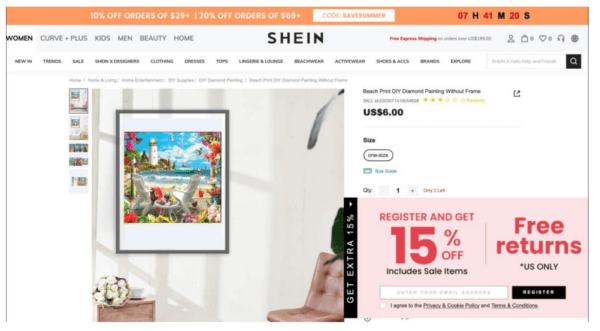Shein Accused of ‘Industrial-Scale’ Copyright Infringement in New Class Action Lawsuit


The legal hits keep on coming for Shein even as the discount shopping app continues to draw shoppers and generate sales in droves. The ecommerce platform — which already is dealing with a number of lawsuits and legislative investigations — is now also facing a class action lawsuit for copyright infringement, filed April 5 in the Southern District of New York. And yet, in spite of all that, Shein raked in an estimated $30 billion in sales globally in 2023 and welcomed more than 8,000 visitors to its latest pop-up event in Canada over the weekend.

The plaintiff in the latest case is Alan Giana, an artist and designer who has earned a living by creating and licensing artwork for the past 30 years. The suit claims that Shein used its “algorithmic technology” to copy Giana’s artwork onto products sold through its app without permission. One example provided in the complaint shows Giana’s original copyrighted work Coastal Escape alongside a Shein listing for “Beach Print DIY Diamond Painting Without Frame” featuring an undeniably similar design.
The class action lawsuit uses Giana as its poster child but maintains that the number of people impacted by Shein’s practices likely number in the thousands or tens of thousands. Giana is asking for damages and injunctive relief against the alleged “industrial-scale scheme of systematic, digital copyright infringement of the work of small designers and artists.”
Citing reporting from The Guardian, The Economic Times, Drapers, Just Style, Reuters, Harvard Business Review, KrASIA and others to support its claims, the lawsuit outlines in detail how Shein’s on-demand manufacturing model is built on top of “sophisticated electronic systems that algorithmically scour the internet for popular works created by artists like Mr. Giana.”
“Shein’s very business model relies upon rapid mass production, generating thousands of new products per day,” claims the suit. “To churn out new items at such a fever pitch, the outputs of Shein’s algorithm-based design system — in many instances identical copies of copyrighted works — are transmitted directly to Shein’s factories for production, with no human intermediary or compliance function taking care that the algorithm’s designs are not the property of others. Shein supplements its electronic data-mining system with online research and industrial surveillance of its retail competitors. Widespread copyright infringement is baked into the business.”
The lawsuit goes on to claim that Shein’s alleged infringement has only expanded as it has branched out into other categories beyond fashion, often resulting in “copying an entire item, such as a piece of jewelry or a painting, and sells the forgery for a fraction of the price of the authentic product.”
Complaints of copyright infringement on the app aren’t new, with companies including Ralph Lauren, Oakley, streetwear brand Stussy and artist Magdalena Mollman all having previously filed claims of copyright infringement against the platform. In fact, the Wall Street Journal reports that since 2019, Shein has been named as a defendant in almost 10X as many copyright or trademark infringement cases as its fast fashion rival H&M. The rise of hashtags such as #SheinStoleMyArtwork, #SheinArtTheft and #SheinRipoff also attest to the growing ire among creators who feel their work has been illegally copied.
Part of the reason that these previous complaints and lawsuits haven’t resulted in any meaningful changes, according to the Giana suit, is that “Shein treats the costs of litigating and settling copyright infringement claims as a necessary business expense, which it builds into its financial models,” and as a result most defendants settle their infringement cases against Shein without a trial.
In order to perpetrate this widespread infringement, the lawsuit maintains that the company tracks its users’ in-app activity, a widespread practice by most digital platforms that is outlined, and therefore agreed to, by users through the company’s privacy policy. However, according to the lawsuit, Shein also asks users to allow it access to their “data and activity from other apps, including social media, in exchange for discounts and special deals on Shein products,” thereby allowing the platform to “identify the specific products that its customers view on non-Shein websites and apps in real time, order its suppliers to manufacture identical products, and then offer counterfeit and infringing products on the Shein websites and apps.”
“Shein’s target demographic includes young users of social media platforms such as TikTok and Instagram,” points out the lawsuit. “With the constant flow of user-generated content on these sites, new fashion trends emerge daily, driven by the popularity of fashion items and creative works created by small businesses and independent designers. Shein’s sophisticated, for-profit surveillance and copying system results — by design — in product listings on Shein’s site that copy and infringe the designs of others, many times even after the actual designers have notified Shein that it is selling infringing works.”
Shein declined to comment for this story.











